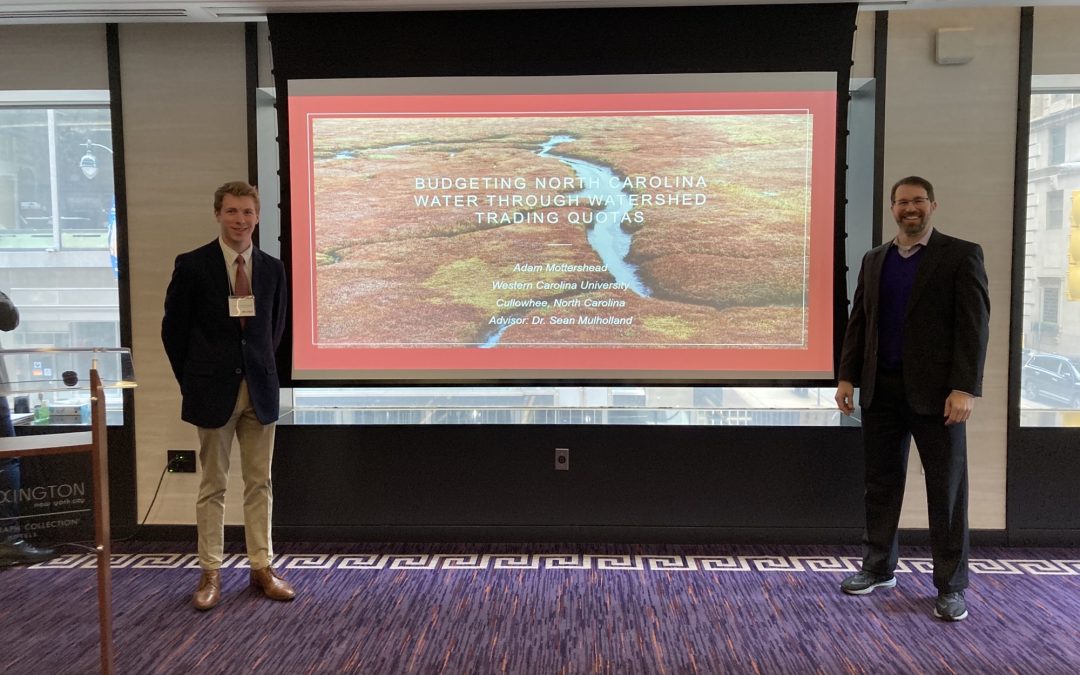Our content marketing specialist, Allie Todd, sat down with Adam Mottershead to talk about his recent work on water rights with newly appointed Center for the Study of Free Enterprise (CSFE) Director, Sean Mulholland, and Adam’s future aspirations in the field.
Adam recently graduated from Western Carolina University (WCU) with a degree in natural resource management and a cultivated passion for natural resource economics after taking a class with Professor Sean Mulholland.
Growing up involved in Boys Scouts and an Eagle Scout himself, Adam loved the outdoors. WCU became the place for him to fuel his passions for academia, the outdoors, and economics.
Now a graduate, Adam is still in the area, taking additional mathematics and economics classes at WCU in preparation for graduate school in the field of natural resource economics. Adam is also assisting Sean Mulholland on further research on stream restoration and banking.
During his time at WCU, Adam became interested in water use in North Carolina. After a bit of digging, he discovered that most watersheds had excess water available. But, a few watersheds, particularly the Upper Neuse, home to Raleigh and Durham, were in deficit. His findings, “Budgeting North Carolina Water through Watershed Trading Quotas,” were published in the latest issue of the Issues in Political Economy journal.
This research focuses on the watersheds in North Carolina and how adopting a new policy of percentage-based trading quotas could potentially ensure an adequate amount of water for all residents. This new policy would differ from other policies throughout the United States, especially on the West Coast, as this would reassess the water availability every five years. This would mean the percent allotted would stay the same for residents, but the gallons per percent would shift upon reevaluation. The voluntary trading model of this policy would largely leave current daily water use unaffected while at the same time, encouraging water conservation through trading.
The implementation of this policy, or a policy of this nature, would allow for both trading and conservation across the state, while allowing for the watersheds in a deficit to achieve dynamic equilibrium by purchasing from watersheds in surplus.
The water rights allocation would provide users a water right claim that they could use, lease, or sale. “The hope is that through this market, people will have a method of trading. This incentivizes conservation of water through residents finding ways to reduce their water use and sell a surplus,” Adam said, continuing, “Another added benefit that we think would happen from this system is the development of a water infrastructure grid throughout the state. So just like electricity where you can buy and sell energy back into the grid, you could buy and sell water back into the grid.”
This detailed, thoughtful research led Adam to presenting his paper at the undergraduate research sessions of the Issues in Political Economy Conference in New York City in February of this year. This conference allowed him to gain valuable feedback to propel his research forward. He also presented his findings at the SoCon Undergraduate Research Forum this fall.
Adam is currently serving as a research assistant for the CSFE and is investigating stream restoration, banking, and water quality across the United States. We are very excited to welcome Adam Mottershead into the CSFE community and to continue to witness the impact his continued research has on not only the immediate community, but North Carolina as a whole.
Thanks to Adam for making his work a part of CSFE.

